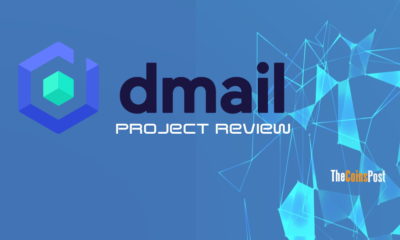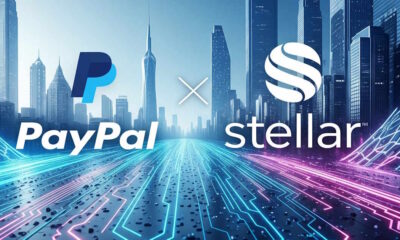Altcoins
Top 15 Programming Languages for Building Blockchain Applications

The new blockchain technology has opened up new possibilities to build decentralized applications and smart contracts. With so many blockchain programming languages to choose from, it can be a challenging task to decide which one would best for building blockchain applications. In this article, we will take a look at the top 15 programming languages that are used to build blockchain decentralized application (DApp).
Contents
1- Solidity
Solidity is a programming language specifically designed for the Ethereum blockchain. It is a contract-oriented, high-level language that is similar to JavaScript. Solidity allows developers to write smart contracts that can be deployed on the Ethereum blockchain. It is the most popular language for building decentralized applications on Ethereum and is supported by a large community of developers.
Some of the applications of Solidity include creating decentralized exchanges (DEX), token issuance, creating decentralized autonomous organizations (DAOs) which is a digital organization that can operate on its own and make decisions based on the consensus of its members and building Decentralized finance (DeFi) apps.
2- Go
Go, also known as Golang, is a programming language developed by Google in 2009. It is a statically-typed, open-source language that is known for its simplicity and ease of use. Go is particularly well-suited for distributed systems and network programming, making it a popular choice for building blockchain applications.
In the context of Ethereum, Go is used to build blockchain nodes that run on the Ethereum network. These nodes are responsible for validating transactions, maintaining a copy of the blockchain, and relaying information to other nodes on the network. The official Ethereum client, Geth, is written in Go, and it is a widely used tool for running a full Ethereum node.
Go is also used to develop smart contracts on the Ethereum blockchain. It is a powerful language that can be used to build complex decentralized applications (dApps) and can also be used to interface with other smart contract languages like Solidity.
3- JavaScript
JavaScript is a programming language that is widely used for web development. It is also a popular choice for building blockchain applications because of its flexibility and the large number of libraries and frameworks available. JavaScript is used to build decentralized applications on platforms like Ethereum, Hyperledger, ARK, and LISK.
4- C++
C++ is a powerful, high-performance programming language that is widely used for system programming and developing operating systems, video games, and other applications. It is also a popular choice for building blockchain applications because of its ability to handle complex data structures and its support for multi-threading. C++ is used to build the Bitcoin and Litecoin blockchain.
5- Python
Python is a popular, high-level programming language that is known for its simplicity and ease of use. It is widely used for web development, machine learning, and data analysis. Python is a popular choice for building decentralized applications on Hyperledger because of its support for multi-threading and its many libraries and frameworks.
Python has several libraries and frameworks that make it easy to build blockchain applications, such as web3.py and py-evm, both of which provide a Python interface for interacting with Ethereum networks. Additionally, Python’s large and active community and its many development tools and resources make it a popular choice for blockchain developers.
6- Rust
Rust is a programming language that was developed by Mozilla. It is a statically-typed language that is known for its speed and memory safety. Rust is a popular choice for building decentralized applications on Ethereum because of its ability to handle complex data structures and its support for multi-threading.
Like Python, Rust has a large and active community, with many development tools and resources available for building blockchain applications. However, it’s worth noting that Rust is a relatively new language for blockchain development, and it may not be the best choice for all use cases, particularly for developers who are new to blockchain development or not familiar with systems programming.
7- C#
C# is a modern, object-oriented programming language developed by Microsoft. It is widely used for developing desktop and web applications, mobile apps, and video games. In the context of blockchain, C# is a popular choice for building decentralized applications and smart contracts on Hyperledger.
C# provides several libraries and frameworks that make it easy to build blockchain applications, such as the Hyperledger Sawtooth SDK and the Hyperledger Fabric SDK. Additionally, C# has a large and active community and its many development tools and resources make it a popular choice for blockchain developers.
8- Java
Java is a popular, general-purpose programming language that is known for its “write once, run anywhere” capability. It is widely used for developing desktop and web applications, mobile apps, and video games. In the context of blockchain, Java is also a popular choice for building decentralized applications and smart contracts on Hyperledger.
Java provides several libraries and frameworks that make it easy to build blockchain applications, such as the Hyperledger Fabric Java SDK and the Hyperledger Sawtooth Java SDK. Additionally, Java has a large and active community and its many development tools and resources make it a popular choice for blockchain developers.
9- Ruby
Ruby is a dynamic, object-oriented programming language that is known for its simplicity and readability. It is widely used for web development, automation, and scripting. In the context of blockchain, Ruby is a popular choice for building decentralized applications on Ethereum.
Ruby library has a library called Eth, using it makes it easy to interact with Ethereum networks, deploy and interact with smart contracts, and manage user accounts and transactions. Additionally, Ruby has a large and active community and its many development tools and resources make it a popular choice for blockchain developers.
10- Kotlin
Kotlin is a statically typed programming language that runs on the Java Virtual Machine. It is fully interoperable with Java and it was developed by JetBrains, the company behind the popular IntelliJ IDEA Java IDE. In the context of blockchain
11- Swift
Swift is a powerful, general-purpose programming language developed by Apple. It is widely used for developing iOS and macOS applications, as well as server-side programming. Swift is known for its fast performance and modern syntax, and it is becoming a popular choice for building decentralized applications on blockchain platforms.
12- R
R is a programming language and software environment for statistical computing and graphics. It is widely used for data analysis, machine learning, and data visualization. In the context of blockchain, R is being used to build decentralized applications that require data analysis and data visualization.
13- Perl
Perl is a high-level programming language that is widely used for system administration, web development, and text processing. In the context of blockchain, Perl is being used to build decentralized applications that require text processing and system administration.
14- TypeScript
TypeScript is a statically typed superset of JavaScript that was developed by Microsoft. It is widely used for developing large-scale, enterprise-level applications. In the context of blockchain, TypeScript is being used to build decentralized applications that require a statically typed language.
15- Scala
Scala is a statically typed, object-oriented programming language that runs on the Java Virtual Machine. It is widely used for developing large-scale, scalable applications, and it is becoming a popular choice for building decentralized applications on blockchain platforms. Scala is known for its strong type system, functional programming features, and its ability to handle large amounts of data.
Conclusion
I have listed the top 15 programming languages that are used for building blockchain applications. Please note that each of these programming language has its own strengths and weaknesses, and the choice of which language to use will depend on the specific requirements of the blockchain application being developed. I would recommend doing thorough research and ask experts in the blockchain field before making a final decision on which language to use.
Altcoins
P2P NFT Trading Platform Faces Breach: Users Urged to Take Immediate Action

NFT Trader, a peer-to-peer (P2P) trading platform, recently experienced a security breach leading to the unauthorized transfer of significant NFT assets. The attacker, identified as 0x90…8fda, successfully made off with 37 Bored Ape Yacht Club (BAYC), 13 Mutant Ape Yacht Club (MAYC), 4 World of Women, and 6 VeeFriends NFTs, collectively valued at 1,080 ETH (approximately $2.4 million). Users are strongly advised to promptly revoke any authorization granted to the platform.
Initial reports, shared by Chinese crypto news reporter Colin Wu on social media, indicate that the pilfered NFTs were sent to the address 0x909F2159780e64143CF08f32dBBF56Ed19478fda (link to tweet). An on-chain message from the address holder, claiming the role of a “scavenger,” refutes allegations of hacking the P2P trading platform. Instead, they assert rescuing the NFTs with the intention of returning them.
Further information reveals that the alleged real hacker’s address is 0x3dc115307c7b79e9ff0afe4c1a0796c22e366a47b47ed2d82194bcd59bb4bd46.
NFT Trader has acknowledged the security incident and disclosed that the attack targeted old smart contracts. In response, the platform is advising users to remove delegations via Revoke.cash from the following addresses:
- 0xc310e760778ecbca4c65b6c559874757a4c4ece0
- 0x13d8faF4A690f5AE52E2D2C52938d1167057B9af
Despite being relatively unknown among NFT traders, NFT Trader’s website identifies its CEO as John Pak, collaborating with co-founders Mattia Migliore and an individual using the pseudonym “Bruckzr” (link to tweet).
On social media, an NFT collector (@dingalingts) has urged traders to “revoke approval to their contract ASAP” for those who have engaged with NFT Trader previously. The stolen digital assets, which exceed $2 million in value, include 37 BAYC, 13 MAYC, 4 World of Women, and 6 VeeFriends.
Altcoins
Uphold Exchange Announces Evernode Airdrop for XRP Holders

Uphold exchange has revealed its support for the upcoming Evernode Airdrop. The airdrop, exclusively for XRP holders, promises to reward participants with EVRS tokens.
The Evernode Airdrop: What You Need to Know
Scheduled for September 1, 2023, at 6:00 PM AEST (8:00 AM UTC), the Evernode Airdrop snapshot is poised to capture the XRP holdings of participants. This snapshot is a pivotal moment as it forms the basis for determining the proportion of EVRS tokens that qualifying XRP holders will receive. It’s important to note that this snapshot will consider XRP holdings up to a limit of 50,000 XRP tokens, ensuring a level playing field for all participants.
The fairness and equality of the distribution process is a core principle of this airdrop. Uphold is keen on ensuring that participants receive EVRS tokens in a manner that reflects their XRP holdings accurately. This approach not only promotes inclusivity but also reflects Uphold’s dedication to creating value for its user base.
Factors Influencing Airdrop Date and Availability
While the snapshot is scheduled for September 1, the airdrop date itself remains contingent on various external factors. Particularly, the launch of the new Xahau Network holds sway over the timeline. Uphold is steadfast in keeping its users informed about any updates regarding the airdrop’s timeline. Participants should be aware that initial access to EVRS tokens on the Uphold exchange might be limited. Uphold’s stringent listing criteria and liquidity requirements must be met before the tokens become fully tradable.
Qualification and Distribution Process
Participating in the Evernode Airdrop is refreshingly straightforward. To qualify, users need only hold XRP in their Uphold accounts at the time of the snapshot. The distribution of EVRS tokens to eligible participants will occur once the Evernode project finalizes the airdrop date and completes the process. This ensures that participants who met the qualification criteria during the snapshot will receive their rightful share of EVRS tokens.
Exploring Ripple XRP: A Unique Blockchain Perspective
As the Evernode Airdrop garners attention, it’s an opportune moment to delve into Ripple XRP’s distinct blockchain characteristics. Unlike many other cryptocurrencies, XRP is not mined. Instead, all 100 billion XRP tokens were created when the blockchain was established. This approach fosters stability and predictability within the XRP ecosystem.
One of XRP’s primary use cases is its role as a bridge currency for cross-border transactions. Ripple’s network and technology enable seamless and efficient cross-border payments, transcending the limitations of traditional systems. The platform’s speed and low transaction costs position it as a viable alternative to conventional remittance methods.
Additionally, XRP’s consensus mechanism deviates from the energy-intensive proof-of-work (PoW) approach used by Bitcoin. XRP employs the consensus protocol to validate transactions, enabling faster transaction settlement times and energy efficiency.
Altcoins
Vietnam’s Crypto Crackdown: Authorities Investigate Pi Network

Vietnamese authorities have launched an investigation into the activities surrounding the Pi cryptocurrency, citing concerns over its complex and unregulated nature. The Department of Cybersecurity and High-Tech Crime Prevention expressed apprehension regarding the high-income potential and multi-level marketing resemblances associated with cryptocurrency models like Pi.
According to Vietnam Express, the investigation aims to address the risks posed by such ventures and protect investors from potential fraud and data breaches. This article delves into the recent developments surrounding the Pi cryptocurrency in Vietnam and the concerns raised by authorities.
Le Xuan Minh, the head of the Department of Cybersecurity and High-Tech Crime Prevention, highlighted the increasing complexity and unmanaged nature of cryptocurrency models like Pi. He noted instances where individuals have been coerced by cryptocurrency promoters into participating in business models resembling multi-level marketing schemes. Multiple police forces across localities are actively investigating activities related to the Pi cryptocurrency. Authorities caution the public against investing in cryptocurrency models offering abnormally high profit margins or employing multi-level marketing strategies due to the associated risks.
The Pi Network, which emerged in 2019, experienced a surge in popularity in Vietnam during 2021. However, concerns have been raised regarding the lack of transparency exhibited by the cryptocurrency. Experts in the field of blockchain have emphasized the potential for Pi to be misused for fraudulent activities or unauthorized data collection. Despite these concerns, many individuals still hold faith in Pi, often under the assumption that they have nothing to lose by participating. However, they unknowingly expose themselves to the risk of personal data theft.
Cryptocurrencies are not recognized as legal tender in Vietnam. Engaging in activities such as issuing, trading, or using cryptocurrencies for payment can lead to penalties of up to VND100 million (US$4,240). The ongoing investigation into Pi cryptocurrency serves as a reminder that individuals should exercise caution when participating in unregulated crypto ventures.
-

 Altcoins5 years ago
Altcoins5 years agoProject Review: Pi Network, a New Scam Project in Town
-

 Bitcoin5 years ago
Bitcoin5 years agoBitcoin Worth $1.2M Seized From Arrested Indian Hacker
-

 Altcoins6 years ago
Altcoins6 years agoReview: Play Arcade Games Inside ARK Wallet And Win Some Free Cryptocurrency
-

 Blockchain6 years ago
Blockchain6 years agoA Full Review: Utopia A New Decentralized P2P Blockchain
-

 Bitcoin6 years ago
Bitcoin6 years agoAnother Exit Scam: NovaChain Shuts Down
-

 Exchanges6 years ago
Exchanges6 years agoCrex24 Will Require KYC Verification
-

 Bitcoin6 years ago
Bitcoin6 years agoJohn McAfee Has Gone Missing
-

 Blockchain6 years ago
Blockchain6 years agoProject Review: Dmail Decentralized Blockchain Email



















